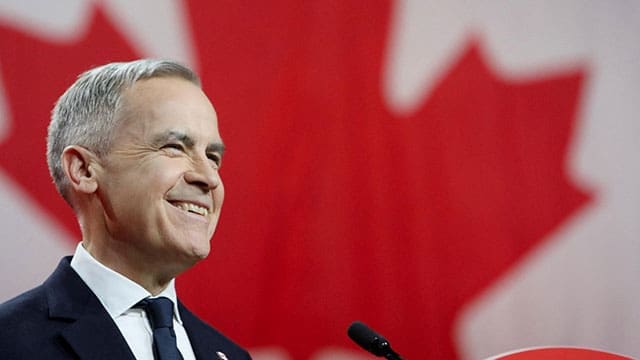His focus on regulation, net-zero targets and federal control threatens our economic prosperity
To understand the core issues in this election—and Donald Trump’s worldview—consider a simple model: symbolists vs. builders.
Symbolists—lawyers, accountants, educators, bureaucrats—work in abstractions: words, numbers and ideas. Builders, by contrast, work with their hands to produce tangible things: ships, houses, tools.
Of course, modern economies need both. But the imbalance today lies in how we favour the symbolic—those who speak, regulate and measure—over those who make.
For years, experts predicted that advanced economies would become “weightless,” generating prosperity by designing, patenting and managing, while outsourcing material production to less developed countries. In theory, global trade makes sense—specialize in your strengths, let others handle the rest.
In practice, Trump argues, this model drains America of both strength and soul.
Strength, for him, includes military might. Wars still require people and machines to destroy other people and machines. The Allies won the Second World War partly because Americans and Canadians had the unmatched capacity to build ships, tanks and planes—and to train soldiers who could use and maintain them. Outsourcing that capacity, Trump believes, makes a nation vulnerable.
Soul is more intangible. Not everyone fits—or wants to join—the symbolist class. For many, building real things provides meaning the abstract world overlooks. Trump’s “forgotten Americans” feel discarded by an elite that neither respects nor understands them. He imagines a renewed America where builders don’t just survive, but thrive, measured not only in absolute terms but relative to symbolist elites. Many of these elites—especially in left-leaning universities—despise him, partly because they lack empathy for builders.
Now, Trump is no tradesman—his career has revolved around branding, finance and media. But politically, he channels the frustration of those who build and fix, rather than draft and interpret.
The green agenda often deepens this divide. Net-zero targets often mean shifting manufacturing and energy production abroad, to countries with lower environmental and labour standards. Global emissions don’t fall—they just move out of sight. Trump sees this as a hollow trade-off that weakens the American core.
This symbolist-builder tension doesn’t stop at the U.S. border. It’s playing out in Canada too—subtly, but significantly—and may well shape the next federal election.
Canadians appear poised to elect Mark Carney, the quintessential symbolist. In uncertain times—amid Trump’s rising influence and economic unease—Carney’s stiff, technocratic calm can seem reassuring.
But Pierre Poilievre, once the top contender, now appears to many as too feisty, too funny, too blunt. Yet he speaks the language of builders. He sees symbolists as roadblocks. Take housing: he blames endless red tape and high interest rates—driven by public debt and Liberal overspending—for the crisis. He sympathizes with the construction industry and wants to unleash it. Carney, by contrast, prefers central planners to steer development—federal bureaucrats over provincial, municipal or Indigenous leaders, and certainly over individual Canadians.
It’s the same with energy. Poilievre wants it produced here, by Canadians. Carney hedges—layers of taxes, regulations and net-zero targets. Meanwhile, under Trump, U.S. energy production outpaces ours. Canadians admire Carney’s résumé—central banker, global titles—but his book Value(s) reads like a dull sermon. He calls for “measuring what matters,” but offers no humility about who decides what matters—or at what cost. Think Snow Gray and the Seven Enablers.
Carney is a collectivist. His values are social metrics—like “progress”—defined by elites. There’s little room for individual freedom or diverse meanings of success. Freedom is a value too—and Carney overlooks it.
He also suffers from Maslow’s hammer syndrome: if you’re a hammer, everything looks like a nail. He fixates on singular metrics—first inflation, now net-zero—while ignoring broader human well-being. What about prosperity, health outcomes or emotional resilience? During COVID-19, excessive lockdowns likely cost more lives than they saved. But Carney dismisses rigorous cost-benefit analysis when it threatens his fixations.
Ironically, builders like Trump defend free expression more than symbolists, despite the latter working with words. But symbolist elites control the institutions—academia, media, public service. Try getting a university job if you challenge the dominant ideology. Dissent isn’t treated as diversity of thought—it’s branded disinformation.
In Canada, Poilievre has repeatedly challenged these symbolist elites. Trudeau embraced them. Expect the same from Carney.
So how should Canada respond to Trump’s agenda?
We must guard our sovereignty. But we can’t just react to Trump—we must strengthen ourselves. The economic cost of suffocating our natural resource industries—one to two per cent of GDP annually—is roughly equal to the expected fallout from trade wars.
This moment could prompt more Ottawa-led overreach—or it could inspire a rebalancing of the federation, leaving more room for new ideas and regional initiatives.
This election should ask: how do we re-energize Canada?
Under Carney, expect fewer homes, fewer cars, less energy, and less freedom, innovation and creativity. His reliance on central planning and abstract targets will slow approvals, raise costs and dampen initiative.
Will Canadians choose symbolist Carney or builder Poilievre?
Bryan Schwartz is a professor of law at the University of Manitoba.
Explore more on Federal election, Liberal Party, Conservative Party, Coercive progressivism
The views, opinions, and positions expressed by our columnists and contributors are solely their own and do not necessarily reflect those of our publication.
Troy Media empowers Canadian community news outlets by providing independent, insightful analysis and commentary. Our mission is to support local media in helping Canadians stay informed and engaged by delivering reliable content that strengthens community connections and deepens understanding across the country.




